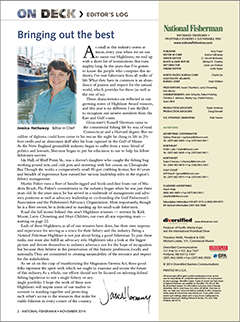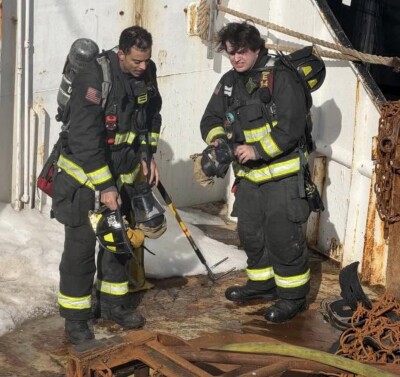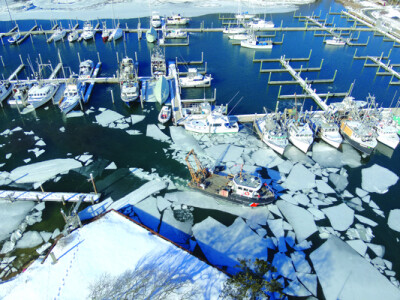Bringing out the best
By Jessica Hathaway
As small as this industry seems at times, every year when we set out to name our Highliners, we end up with a short list of nominations that runs mighty long. In the years that I’ve gotten to know the people who comprise this industry, I’ve met fishermen from all walks of life. What they have in common is an abundance of passion and respect for the natural world, which provides for them (as well as the rest of us).
These characteristics are reflected in our growing roster of Highliner Award winners, and this year is no different. I am thrilled to recognize our newest members from the East and Gulf coasts.
Gloucester’s Russell Sherman came to the commercial fishing life by way of rural Connecticut and a Harvard degree. But no caliber of diploma could have come to his rescue the night he clung to life in 20-foot swells and an aluminum skiff after his boat capsized in the Gulf of Maine.
As the New England groundfish industry began to suffer from a toxic blend of politics and lawsuits, Sherman began to put his education to use to help his fellow fishermen survive.
Ida Hall, of Bluff Point, Va., was a doctor’s daughter who caught the fishing bug working pound nets, and crab pots and oystering with her cousin on Chesapeake Bay. Though she works a comparatively small 85-pot crabbing license, her 40 years and breadth of experience have earned her various leadership roles in the region’s fishery management.
Martin Fisher runs a fleet of bandit-rigged and hook-and-line boats out of Madeira Beach, Fla. Fisher’s commitment to the industry began when he was just three years old. In the years since, he has served in a multitude of management and advisory positions as well as advocacy leadership in co-founding the Gulf Fishermen’s Association and the Fishermen’s Advocacy Organization. Most importantly, though he is a fleet owner, he is dedicated to standing up for small-scale fishermen.
Read the full stories behind this year’s Highliner winners — written by Kirk Moore, Larry Chowning and Hoyt Childers, our own all-star reporting team — starting on page 22.
Each of these Highliners, as all of our winners have done, has their own impetus and experience for serving as a voice for their fishery and the industry. Being a National Fisherman Highliner is not just about being a good fisherman. To join these ranks, one must also fulfill an advocacy role. Highliners take a look at the bigger picture and devote themselves to industry advocacy not for the hope of recognition but because they believe in the preservation of this historic profession, locally and nationally. They are committed to creating sustainability of the resource and respect for the stakeholders.
As we sit on the cusp of reauthorizing the Magnuson-Stevens Act, these good folks represent the spirit with which we ought to examine and secure the future of this industry. As a whole, our efforts should not be focused on tailoring federal fishing legislation to suit a single fishery or any single portfolio. I hope the work of these new Highliners will inspire some of our readers to commit to standing together and protecting each other’s access to the resources that make for viable fisheries in every corner of the country.








